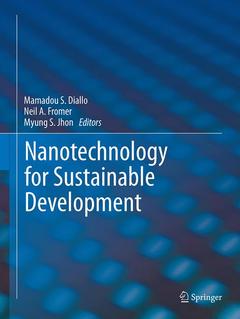Description
Nanotechnology for Sustainable Development, 2014
Coordinators: Diallo Mamadou S., Fromer Neil A., Jhon Myung S.
Language: English
Subjects for Nanotechnology for Sustainable Development:
Keywords
Dye Sensitized Solar Cells; Environmental Effects of Nanoparticles and Nanomaterials; Gas Separation Technology; Nanofiltration Membranes; Nanomaterials for Water Filtration; Nanosustain Conference; Polymer Electron Membrane Fuel Cells; Societal Aspects of Nanotechnology; Solutions for Urban Sustainability Problems
Publication date: 09-2016
Support: Print on demand
Publication date: 06-2014
404 p. · 21x27.9 cm · Hardback
Description
/li>Contents
/li>Biography
/li>Comment
/li>
Prof. Mamadou S. Diallo holds a joint faculty appointment between the Korea Advanced Institute of Science and Technology (KAIST) and the California Institute of Technology (Caltech). At KAIST, Prof. Diallo serves as Associate Professor in the Graduate School of Energy, Environment, Water and Sustainability (EEWS). At Caltech, Prof. Diallo is a visiting Faculty Associate in the Environmental Science and Engineering Department of the Division of Engineering and Applied Science. During the last 10 years, Prof. Diallo and his collaborators have been pioneering the applications of dendrimer nanotechnology to challenging problems in environmental and industrial separations. His current research interests and activities focus on the development of advanced separations materials and systems for sustainable chemistry, engineering and materials (SusChEM) using dendritic macromolecules and polymeric micro/nanofibers as building blocks. Prof. Diallo is also the co-founder and Chief Technology Officer of AquaNano, LLC, a California spin-off company that is developing high performance media for water treatment and environmental remediation. In 2011, he became a member of the Editorial Advisory Board of Environmental Science and Technology. In 2012, Prof. Diallo was appointed as Associate Editor of the Journal of Nanoparticle Research.
Dr. Myung S. Jhon is a Professor of Chemical Engineering, a member of the Data Storage Systems Center (DSSC) and the Institute for Complex Engineered Systems at Carnegie Mellon University in Pittsburgh, PA. Professor Jhon received his B.S. in Physics from Seoul National University, Korea, and his Ph.D. in Physics from the University of Chicago. He has served as visiting professor in several institutions, including the U.S. Department of Energy (National Energy Technology Laboratory and Sandia National Laboratories); the Department of Chemical Engineering, University of California, Berkeley; IBM Almaden Research Center, San Jose; and the Na
A collection of the latest research developments in nanotechnology aimed at improving environmental and energetic sustainability
These books may interest you

Environmental NanotechnologyVolume 1 158.24 €

Environmental NanotechnologyVolume 1 158.24 €


